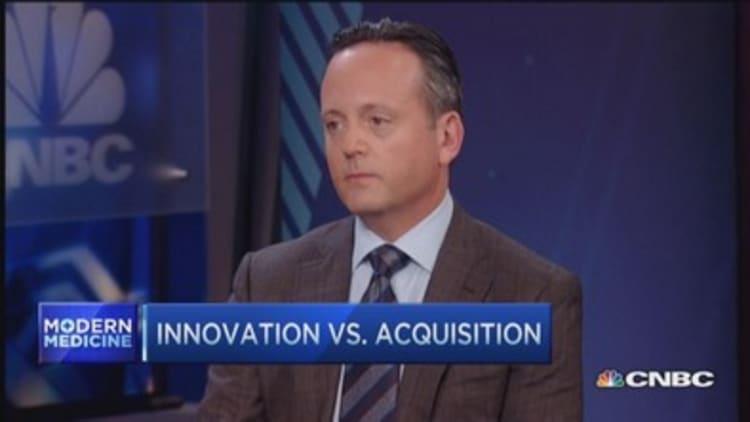
Despite engaging in $100 billion of dealmaking in the last year, Actavis CEO Brent Saunders does not see mergers and acquisitions as the company's primary strategy.
"You have to be committed to R&D and innovation to be successful long term in our industry. However, you have to do things that you have a comparable advantage doing," he told CNBC's "Squawk Box" on Friday. "So for us, we didn't have an advantage in discovery."
The drugmaker's recent deals have included a $66 billion purchase of Allergan in November and a $28 billion buyout of Forest Labs in July. During its $100 billion dealmaking spree, Actavis has not invented new products.
Read More Expect measles outbreak to continue, says doctor
The company did not plan to be so hungry for deals, said Saunders, asserting that Allergan was not part of its strategic plan.
"It was put in play through a hostile situation, and we were opportunistic because it was available and we had a relationship and it fit strategically with what we were trying to do and we could get it at a fair price," he said.
The deal ended a six-month-long hostile takeover bid that pitted Allergan against activist investor Bill Ackman and Valeant Pharmaceuticals.
Over the last 10 years, the return on investment in pharmaceutical research and development has not been great and is probably below the cost of capital, said Fred Hassan, managing director at private equity firm Warburg Pincus.
He told "Squawk Box" that raises the question of whether now is the time to invest in R&D or to be more watchful and opportunistic.
Read MorePatent expirations have put Eli Lilly on a 'roller coaster ride': CEO
Saunders said it is indeed a time to invest, but he noted that overcapacity in the commercial and R&D sides of the business is creating turmoil.
As the customers, hospitals, retailers and wholesalers consolidate, the industry needs to to take some slack out of the market, he said. So while eight drug companies may be targeting the same molecules or methods of action, perhaps only two or three should be doing so, he added.
"That's how you get 'me too' drugs. There's a lot of money spent unnecessarily because there's so much capacity in the market," Saunders said.
Read MoreObama seeks $215 million for 'precision medicine'
—CNBC's Ahuja Maneet contributed reporting to this story.


